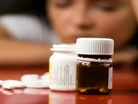Global study shows why antidepressants work better for some

A study conducted by British scientists finds that they have identified biological markers in the blood which should help doctors match patients to the best type of treatment for depression.
The aim of the study is to end the trial and error prescription of antidepressants, which is the only way the depressed patients can find the most effective treatment.
Carmine Pariante of King’s College London’s Institute of Psychiatry, who led the study said, “The study shows that we could use a blood-based test to personalize the treatment of depression.”
She and her colleagues found that high levels of inflammation which show up in biological markers in the blood are part of mechanism leading to depression.
Carmine also said, “If a patient had high levels of inflammation, they could immediately begin with a more intensive treatment programme, like combining antidepressants or stepping up the doses.”
Nortriptyline sold under the brand names Sensoval, Aventyl and others is an older type of antidepressant known as tricyclic. These are both commonly prescribed as first line antidepressant treatments in other countries and Britain.
Post 8 weeks of treatment, researchers found that patients who were not getting any better were ones having higher levels of three inflammation markets before treatment began.



